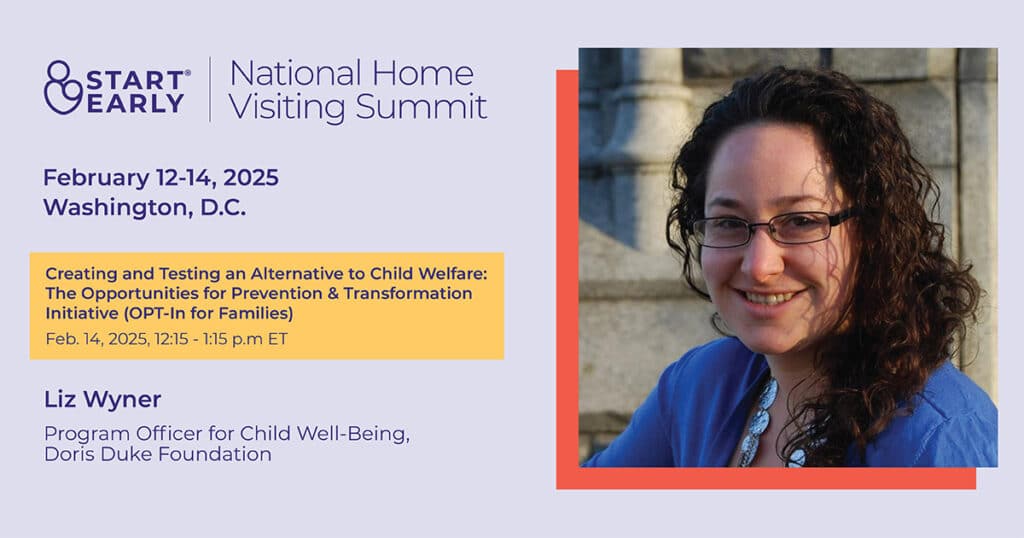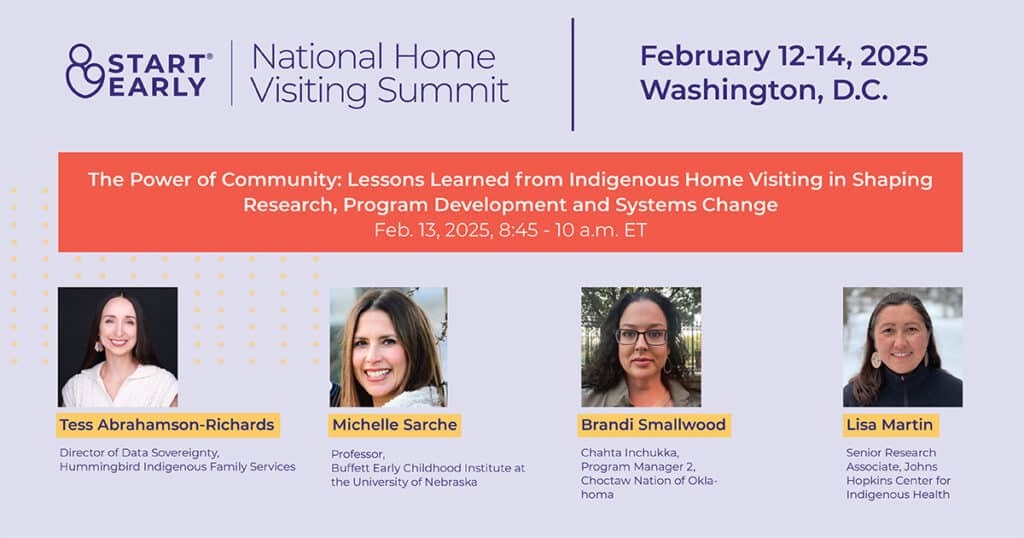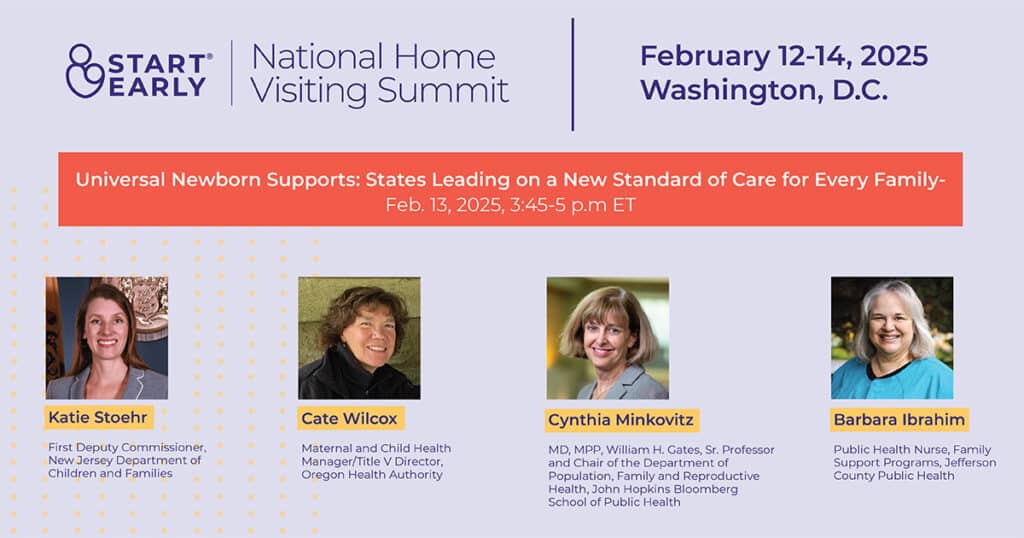We’re excited to announce our Plenary Sessions at the National Home Visiting Summit, Feb. 12-14, 2025! Interested in attending virtually? The three plenary sessions at the conference will be streamed live for those unable to attend in-person. The plenary sessions are the only live content offered virtually at the 2025 Summit.

Plenary Sessions at the National Home Visiting Summit
February 12 - 14, 2025
Learn more about the Plenary Sessions at the 2025 National Home Visiting Summit.
2025 Plenary Sessions
Learn more about the Plenary Sessions at the 2025 National Home Visiting Summit.
Thursday, Feb. 13 - 8:45-10 a.m. ET
The Power of Community: Lessons Learned from Indigenous Home Visiting in Shaping Research, Program Development and Systems Change
Session Description: Indigenous wisdom, ways of knowing, and community- and culturally-based practices are essential for guiding the design, implementation, and evaluation of home visiting programs that serve American Indian, Alaska Native, and Native Hawaiian children and families in the United States. This plenary session will focus on the community and cultural contexts of these Indigenous home visiting programs, and highlight how authentic partnerships between Indigenous communities, home visiting programs, and researchers can support meaningful home visiting research that drives program development and systems change to benefit children, families, and the home visiting workforce. Formatted as an armchair conversation and moderated by Dr. Michelle Sarche (Professor, Buffett Early Childhood Institute at the University of Nebraska), we will hear from Tess Abrahamson-Richards (Director of Data Sovereignty, Hummingbird Indigenous Family Services), Brandi Smallwood (TMIECHV – Chahta Inchukka, Program Manager 2, Chocktaw Nation of Oklahoma), and Lisa Martin (Senior Research Associate, Johns Hopkins Center for Indigenous Health) who are working in and with Indigenous home visiting programs across the country. Key take-aways will be gleaned that are applicable to audience members holding a range of roles in the home visiting field, whether as program staff, researchers, evaluators, or funders.
About the Speakers
Tess Abrahamson-Richards – Tess Abrahamson-Richards, MPH (she/her), is the Director of Data Sovereignty at Hummingbird Indigenous Family Services. The Data Sovereignty team leads research, evaluation, and data advocacy efforts in service of Hummingbird’s direct service perinatal and birth-to-three programs. Abrahamson-Richards is a citizen of the Spokane Tribe and has lived in Seattle on Coast Salish territory for the past 17 years. A lifelong urban Native, she was born in London, England, before spending most of her childhood in Spokane, Washington, on her maternal ancestral homelands. A mother of two, she is currently pursuing her Ph.D. in social welfare at the University of Washington, where her research is focused on Indigenous reproductive justice, policy, holistic family well-being, and access to parental leave. She was honored to be selected as a 2024 Aspen Institute Ascend Fellow, collaborating with a diverse cadre of leaders working to advance the well-being and prosperity of all children and families. Prior to joining Hummingbird, Abrahamson-Richards spent 12 years working in Indigenous evaluation and research roles in university settings and the private sector. In those positions, she served on the leadership team for a multisite evaluation of Tribal early childhood home visiting programs, and led and contributed to a variety of projects focused on Indigenous early childhood, higher education, and public health. Abrahamson-Richards is passionate about evaluation and research that center on participants’ voices, Indigenous methods, community action, stories, and strengths. She is grateful to her community for all of the beautiful, nurturing, creative, resistant and reclaiming spaces we share in and the healing legacies we continue to build across generations.
Michelle Sarche – Dr. Michelle Sarche is a professor in the Centers for American Indian and Alaska Native Health at the University of Colorado Anschutz Medical Campus, Colorado School of Public Health. She is a citizen of the Lac Courte Oreilles Band of Ojibwe tribe and completed a Ph.D. in clinical psychology at Loyola University Chicago, where her focus on Native American health began. In the 27 years since, Dr. Sarche has partnered with Native American communities and early childhood programs in research on children’s development in the context of family, community, culture, and programs such as Head Start, Home Visiting, and Child Care. Her current projects include work with the Tribal Early Childhood Research Center, the Center for Indigenous Research Collaborations and Learning in Home Visiting, the Community-Driven Indigenous Research, Cultural Strengths, and Leadership to Advance Equity in Drug Use Outcomes Center, and two randomized controlled trials of a culturally adapted alcohol-exposed pregnancy prevention program. Through the Native Children’s Research Exchange, Dr. Sarche has served as a mentor to numerous early career scholars, and as conference convener for a national network of Indigenous and allied researchers. Dr. Sarche is an Aspen Institute Ascend Fellow, ZERO TO THREE Board member, and the 2018 National Indian Head Start Association Child Advocate of the Year. She also received an honorary doctorate from the Erikson Institute in 2024. Dr. Sarche is grateful for the close collaborations with academic and community partners across the country over many years that have made her work possible. After nearly three decades in her current position, she will soon retire and assume a new faculty position at the University of Nebraska and the Buffett Early Childhood Institute.
Brandi Smallwood – Ms. Brandi Smallwood, a member of the Choctaw Nation of Oklahoma and Oklahoma State University Alumni, has devoted the last 19 years to serving Native American children and families within the Choctaw Nation of Oklahoma’s reservation. Beginning in 2005, Brandi served as a Home Visitor for CNO Adolescent Family Life working with pregnant and parenting teen mothers and their children. In 2010, Ms. Smallwood transitioned into a new position as Program Manager for Chahta Inchukka, Choctaw Nation’s Tribal Maternal, Infant and Early Childhood Home Visitation grant and has continued to serve the program in this capacity for the past 14 years.
Lisa Martin – Lisa Martin, MPH, is a member of the Ojibwe Nation and enrolled in the Sault Ste. Marie Tribe of Chippewa Indians. Lisa is a Senior Research Associate at the Center for Indigenous Health at Johns Hopkins University Bloomberg School of Public Health. For the past 17 years, she has contributed to the field of home visitation in various roles connected to addressing program development and implementation, research practice in underrepresented communities, and identifying systemic inequities and supporting planning to address them. She has extensive experience managing various projects in partnership with Indigenous communities. She received her MPH from the University of Arizona in 2003. Lisa’s current projects include content development of the Family Spirit home visitation curriculum and support of research projects associated with Family Spirit implementation. She is a key lead on the development of the Family Spirit Thrive curriculum for caregivers with children age 3-5, a member of the Family Spirit +Language is Medicine development team, and a Co-PI of the Family Spirit Strengths randomized control trial. Lisa also participates on the Wiba Anung (Early Star) team which engages in Tribal Participatory Research among Tribal communities in Michigan. The current focus is to integrate Indigenous foods and land-based learning into early childhood classrooms and home visitation programs across the nation. In addition, she is a member of the Tribal Early Childhood Research Center (TRC) Steering Committee. Lisa has devoted her professional career to co-creating the implementation of evaluation and research studies in partnership with Indigenous communities.
Thursday, Feb. 13 - 3:45-5 p.m. ET
Building Systems for Universal Newborn Support: Perspectives from State Leaders
Session Description: Unlike many high-income nations, the United States lacks a comprehensive, universal approach to screen all families for health risks of both the newborn and their parents and to provide connections to vital community resources. Join this plenary session to hear from two states at the leading-edge of developing statewide universal newborn support systems that will reach every family with a new baby in the first few weeks after birth. Katie Stoehr, First Deputy Commissioner of the New Jersey Department of Children and Families, Cate Wilcox, Manager of the Maternal and Child Health Section of the Oregon Health Authority, and Barbara Ibrahim, Public Health Nurse, Family Support Programs with Jefferson County Public Health will share key insights from their respective states’ journeys to building statewide universal newborn support systems. This plenary session will be moderated by Cynthia Minkovitz, MD, MPP, with the Johns Hopkins Bloomberg School of Public Health, and will include state perspectives on what it takes to build political and administrative support for universal newborn support systems, essential considerations concerning infrastructure and the administration of these systems, and the integration of these universal touchpoints within with health and early learning services.
About the Speakers
Katie Stoehr – Katherine (Katie) Stoehr is the first deputy commissioner of the New Jersey Department of Children and Families. Her career has spanned over two decades in child welfare reform across multiple U.S. jurisdictions. Stoehr began her career in support of children and families in an East Harlem-based foster care program. Throughout her career, she has held executive responsibility for management of direct services, and has managed strategic planning, policy development, performance monitoring, and implementation of revenue maximization strategies at both government and non-profit agencies. At the Department of Children and Families, she currently oversees prevention, strategic development, and analytic and systems improvement portfolios, leading work that focuses on building innovative approaches to supporting families before crises occur. Stoehr earned a master’s degree in public administration from the Columbia University School of International and Public Affairs, and a B.A. in politics and philosophy from the University of Pittsburgh. She is a proud Returned Peace Corps Volunteer.
Cate Wilcox – Cate Wilcox is the Maternal and Child Health Section Manager and Oregon’s Title V Director, in the Public Health Division of the Oregon Health Authority. She leads the state-level public health efforts for Oregon’s Women’s and Perinatal Health, Child Health, Oral Health, and MCH Assessment, Evaluation, and Informatics. Programs under her guidance include nurse home visiting, MIECHV, the Universally Offered Home Visiting Initiative, Early Hearing Detection and Intervention (EHDI), Domestic and Sexual Violence Prevention, Maternal Mortality Review Committee, PRAMS, Dental Pilot Projects, and the Title V program, among others. Prior to joining the Oregon Health Authority, Wilcox gained over seven years of direct service delivery management experience at Planned Parenthood of the Columbia-Willamette Region, where she oversaw the medical operations for 11 health centers serving three-quarters of Oregon and southwest Washington state. Prior to her work in Oregon, she worked for over 12 years in international reproductive health communications, and community-level health education and training at the Johns Hopkins University Center for Communication Programs in Baltimore, Maryland. Wilcox has worked for the Oregon Health Authority for 16 years, holds a bachelor of science degree in human development and family studies from Colorado State University, a master’s degree in public health from the University of North Carolina at Chapel Hill, is a graduate of the Maternal and Child-Health-Public Health Leadership Institute, and served as board president for the association of Maternal & Child Health Programs. She has two daughters (21 and 16) and a 100-pound lab-mastiff-pit mix named Finn.
Cynthia Minkovitz – Cynthia Minkovitz, MD, MPP, is the William H. Gates, Sr. Professor and Chair of the Department of Population, Family and Reproductive Health at Johns Hopkins Bloomberg School of Public Health, and a professor of pediatrics at the Johns Hopkins School of Medicine. For over 25 years, her research has focused on enhancing systems of care and the quality of preventive services for children and families. Dr. Minkovitz serves on the Leadership Team for the Home Visiting Applied Research Collaborative (HARC), a national research and development platform for innovation to broaden and strengthen the benefits of home visiting for all families and communities. Dr. Minkovitz has led multiple evaluations for national and state initiatives and co-led the development of a framework for service coordination in the early childhood system. She co-leads the Resource and Coordinating Center for ENRICH, a clinical trial to test the effectiveness of strategies in home visiting to promote cardiovascular health for mothers and their young children and reduce related disparities. Dr. Minkovitz also directs the Johns Hopkins Center of Excellence in MCH Education, Science and Practice, and is the recipient of the Academic Pediatric Association’s Research Award and multiple mentoring and teaching awards.
Barbara Ibrahim – Barbara Ibrahim BSN, RN, IBCLC, IMH-E has been supporting families through home visiting systems in rural Jefferson County, Oregon for over 20 years and has been working in Public Health County and Tribal health systems for most of her 36-year nursing career. Barbara was recently followed by CNN’s Meg Tirell and NPR’s Cody Turner, helping them learn more about Family Connects Oregon and Nurse Home Visiting in Oregon. Barbara has also previously worked as a Healthy Families Oregon supervisor and believes strongly in supporting home visiting’s workforce and systems to enable us to help families provide the best start possible for infants and children. Barbara is passionate about being a lifelong learner and has enhanced her services to families by obtaining her International Board-Certified Lactation Consultant credential in 2005, her Infant Toddler Mental Health endorsement in 2019, and she completed a Graduate Certificate in Infant Mental Health through Portland State University in 2020. Barbara is a 1988 graduate of Linfield University as a first-generation college student. Barbara is beginning to think toward her post-retirement passion projects and is beginning to partner with women in Nigeria through targeted support and coaching for perinatal women, and their infants in her husband’s extended family.
Friday, Feb. 14 12:15 - 1:15 p.m. ET

Creating and Testing an Alternative to Child Welfare: The Opportunities for Prevention & Transformation Initiative (OPT-In for Families)
The Opportunities for Prevention & Transformation Initiative (OPT-In for Families), a new initiative from the Doris Duke Foundation (DDF), aims to demonstrate that actively connecting families to direct support for basic needs and coordinated services using trusted community partners is a cost-effective, scalable way to prevent abuse and neglect and keep families together. Join Liz Wyner, Program Officer for Child Well-Being, Doris Duke Foundation, for a deep dive into the landscape of prevention-oriented child well-being systems through the OPT-In for Families initiative. Attendees will learn how this national, multisite demonstration project aimed at creating and testing an alternative to child welfare is opening the door for prevention-based approaches and ideas around what is needed to create a comprehensive prevention-focused system. This plenary will describe the array of critical components of successful prevention-oriented systems, including home visiting, and it will elevate stories from families and programs that demonstrate the impacts of OPT-In and related programmatic, policy, and systems transformations.
About the Speakers
Liz Wyner – Liz Wyner is the program officer for child well-being at the Doris Duke Foundation. In this role, she supports the program director in the planning, design, management and evaluation of program grants. Before joining the foundation, Wyner held the position of associate director at the Mount Sinai Parenting Center. There, she led a team focused on training doctors in the science of child development and parenting. Prior to her role at Mount Sinai, Wyner served as the Director of Strategy Planning and Analysis in the Division of Prevention Services at New York City’s Administration for Children’s Services, overseeing a team dedicated to enhancing the prevention service system in the city. She also has experience as a philanthropy advisor, assisting funders in maximizing the impact of their investments in public health, education and conservation programs. Wyner holds a Bachelor of Arts degree from Wesleyan University and earned both a Master of Public Health and a Master of Public Administration from Columbia University.
Tune in Live to Our Plenary Sessions!
The three plenary sessions at the Summit will be streamed live for those unable to attend in-person! Livestream attendees can earn up to 0.3 CEUs for the plenary sessions.
Explore Past Summits
Stay Connected
Sign up to receive updates on event information for the annual National Home Visiting Summit.
National Home Visiting Summit
The National Home Visiting Summit brings together system leaders, practitioners and advocates in a collaborative pursuit to advance the home visiting field.


